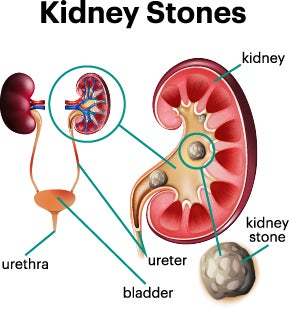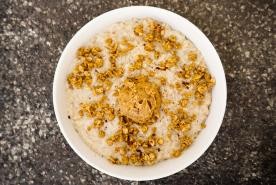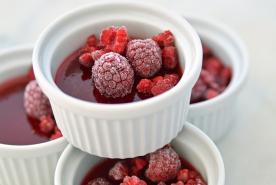Last updated: July 24, 2025
Medically reviewed by: NKF Patient Education Team
Contributions by: Melanie Betz MS, RD, CSR, FNKF, FAND
Learn what causes kidney stones, symptoms, treatments, and how to prevent them with a personalized plan.
About Kidney Stones
A kidney stone is a hard object that is made from chemicals in the urine (pee).
Your kidneys clean your blood and remove waste through your urine. Urine has different chemicals in it. If there is too much of some chemicals and not enough water, they can stick together and form kidney stones. The most common chemicals that cause stones are calcium, oxalate, uric acid, cystine, and phosphate.
After a kidney stone is formed, it can stay in the kidney and not cause issues. Sometimes, kidney stones go down the urinary tract into the ureter. Tiny stones can move out of the body without causing too much pain. However, most of the time kidney stones cause pain from moving down the ureter (YUR-uh-ter) A ureter is a thin tube that carries urine from each kidney to the bladder. as your body works to get rid of them in your urine. Occasionally, kidney stones that don’t move can cause a back-up of urine in the kidney, which can be painful and cause kidney damage.

How often do people get kidney stones
Each year, more than 500,000 people go to the emergency room because of kidney stones. About 1 out of every 10 people will get a kidney stone at some point in their life.
Kidney stones are becoming more common. In the late 1970s, only about 4 out of 100 people had them. By 2014, that number had grown to 10 out of 100. Today, about 1 in 10 people have had a kidney stone. Men are slightly more likely to get kidney stones (11 out of 100) than women (9 out of 100).
If you’ve had one kidney stone, there’s a good chance—about 1 in 2 or more—that you’ll get another one. That’s why it’s important to follow a kidney stone prevention plan, made just for you, to help stop more stones from forming.
Common causes of kidney stones
Most kidney stones are caused by a combination of diet, lifestyle, genetic and medical factors.
Diets that are high in sodium, added sugar, meat, fish and seafood; along with not enough fruits, vegetables, calcium and water can cause kidney stones in susceptible people.
Some diseases can make kidney stones more likely. Some of the most common medical conditions linked with kidney stones are:
- Diabetes: A condition in which your body has trouble controlling the level of sugar (glucose) in your blood.
- Gastric bypass surgery (weight loss surgery): A surgery that helps you lose weight by changing how your stomach and small intestine handle food.
- Inflammatory bowel disease: Causes swelling in the gut, leading to pain, diarrhea, and other digestive problems.
- Hyperparathyroidism (hy-per-para-THY-royd-iz-um): When your body creates too much hormone that causes high calcium, which can lead to weak bones or kidney stones.
- Polycystic kidney disease (PKD): Causes fluid-filled cysts in the kidneys, leading to kidney damage and failure. Learn about symptoms, risks, and treatments.
- Gout: A type of arthritis that causes sudden pain, swelling, and redness in the joints, often starting in the big toe.
- Chronic urinary tract infections: Repeat bladder or kidney infections that cause pain, burning, and the urge to pee often.
- Eating disorders: A health problem where a person has an unhealthy focus on food, body weight, or shape.
People with kidney stones are also at higher risk of other chronic diseases like:
- Osteopenia (ah-stee-oh-PEE-nee-uh): when your bones are weaker than normal
- High blood pressure: When your heart is working too hard to pump blood, which can harm your heart, brain, and kidneys over time.
- Heart disease: When there is a problem problem with the heart or blood vessels that can lead to chest pain, heart attacks, or other serious issues.
- Chronic kidney disease: When your kidneys slowly get damaged and can't do important jobs like removing waste and keeping blood pressure normal.
Types of kidney stones
There are four main types of stones: calcium, uric acid, struvite, and cystine.
- Calcium: Calcium kidney stones can be made of calcium oxalate or calcium phosphate.
- Calcium oxalate kidney stones are the most common type. They are usually caused by a combination of diet, genetic and medical factors. Eating too much sodium, added sugar and protein from meat, poultry and fish can cause calcium kidney stones. Not getting enough calcium can contribute to calcium oxalate kidney stones.
- Calcium phosphate stones are less common than other types. They can form when your urine is too alkaline (say: AL-kuh-line), which means your urine is not very acidic—more like plain water. Certain health problems or medicines can make this happen and raise your risk of getting these stones.
- Uric acid: Another common type of kidney stone. Uric acid kidney stones are often caused by gout or eating too much animal protein from meat, poultry, fish or seafood. People with diabetes are more likely to get uric acid kidney stones.
- Struvite: These stones are rare and are usually caused by urinary tract infections.
- Cystine: These stones are rare and caused by a rare genetic disorder called cystinuria.
If you pass a kidney stone, try to catch it and give it to your doctor to get tested. If your stone is removed by surgery, your doctor should save pieces of your kidney stone to get analyzed.
Knowing what type of kidney stone you have can help prevent future stones. Different types of stones form for different reasons, so the best way to prevent them depends on the type. It also helps your doctor choose the best treatment if you need to have a stone removed.
Symptoms
Kidney stones vary in size. Some kidney stones are as small as a grain of sand. Others are as large as a pebble. A few are as large as a golf ball! As a general rule, the larger the stone, the more noticeable the symptoms.
The symptoms could be one or more of the following:
- Severe pain on either side of your lower back
- More vague or hard to describe pain or stomachache that doesn't go away
- Blood in the urine
- Feeling sick to your stomach (nausea) or throwing up (vomiting).
- Fever and chills
- Urine that smells bad or looks cloudy
Kidney stones hurt when they block urine or scratch the inside of your body. In most cases, kidney stones pass without causing damage, but unfortunately usually cause a lot of pain. Over the counter pain relievers may be the only pain treatment needed for small stones. More pain treatment may be needed for larger stones. Work with your doctor to come up with a plan for pain control that you feel comfortable with.
Diagnosis
Diagnosis of a kidney stone starts with a medical history, physical examination, and imaging tests. Your doctor will want to know the exact size and shape of the kidney stones. This can be done with a high-resolution CT scan from the kidneys down to the bladder or an x-ray called a "KUB x-ray'' (kidney-ureter-bladder x-ray) which will show the size of the stone and its position. The KUB x-ray is often obtained by the surgeons to determine if the stone is suitable for shock wave treatment. The KUB test may be used to monitor your stone before and after treatment, but the CT scan is usually preferred for diagnosis. In some people, doctors will also order an intravenous pyelogram or lVP, a special type of X- ray of the urinary system that is taken after injecting a dye.
Second, your doctor will decide how to treat your stone. The health of your kidneys will be evaluated by blood tests and urine tests. Your overall health, and the size and location of your stone will be considered.
Later, your doctor will want to find the cause of the stone. The stone will be analyzed after it comes out of your body, and your doctor will test your blood for calcium, phosphorus and uric acid. The doctor may also ask that you collect your urine for 24 hours to test for calcium and uric acid.
Treatment of Kidney Stones
Kidney stone removal & monitoring
Urologists are doctors that specialize in the urinary tract and will monitor your kidney stones or do surgery to remove kidney stones, if necessary.
Once a kidney stone has formed, it is important to work with your urologist to come up with the best treatment plan to get rid of that stone. Your urologist will probably order a kidney ultrasound, x-ray and/or CT scan to know exactly where, and how big, your stone is.
Sometimes, if kidney stones are not causing pain or blocking urine, it is ok to let kidney stones sit in your body. Your urologist will check the stones with imaging every few months or once a year. A urologist (say: YUR-all-uh-jist) is a doctor who treats kidney and urine problems, like kidney stones.
If kidney stones are causing pain, there are 2 options:
- Let the kidney stone pass. Most of the time kidney stones are small enough that they can pass through your urethra and come out in your urine. Passing a kidney stone can take hours to weeks. This is often painful, and it is important to work with your doctor for the best pain management plan for you.
- Get the kidney stone removed with surgery. If a kidney stone is too large to pass, or is causing harm by blocking urine, is infected or stuck, the stone will likely have to be surgically removed. Lithotripsy with or without ureteroscopy and percutaneous nephrolithotomy are the most common procedures to remove kidney stones.
Your urologist will help you manage pain with medications. It is also important to drink plenty of water when passing a kidney stone, or after kidney stone surgery.
Most of the time, if a kidney stone has formed, there is nothing that can dissolve it.
Kidney Stone Prevention
If you’ve had one kidney stone, there’s a good chance you could get another one later. About 3 out of 4 people will. Coming up with a personalized kidney stone prevention plan is very important!
The prevention of kidney stones is different for every single person depending on the type of stone they have, and their 24-hour urine collection results. A 24-hour urine collection will help your doctor understand exactly what is causing your kidney stones and if there might be another health condition causing your kidney stones. People who have more than one kidney stone should get a 24-hour urine test at least once a year.
Your urologist might recommend you see a nephrologist (a doctor that specializes in kidney health) for more specialized kidney stone prevention care.
Your doctor might recommend diet and lifestyle changes. Some of the most common diet and lifestyle recommendations for calcium kidney stones are:
- Drinking enough fluid to make 2 ½ liters (85 fluid ounces) of urine each day
- Limiting added sugar and salt
- Eating enough calcium-rich foods
- Avoiding too much protein from foods like beef, pork, chicken, fish and seafood
- Eating more fruits and vegetables
- Avoiding nutrition or herbal supplements
A registered dietitian trained in kidney stone prevention can help you learn what diet changes are best for you, and help you make these changes.
Your doctor might also recommend medication to help prevent more kidney stones. The most common medications for kidney stones are:
- Potassium citrate or sodium bicarbonate: these medications help prevent both calcium and uric acid kidney stones by lowering urine acid levels, and increasing citrate levels
- Thiazide diuretics (i.e indapamide, chlorthalidone): these helps prevent calcium kidney stones by lowering urine levels of calcium
How can you prevent kidney stones
Having a kidney stone is often scary and can be one of the most painful experiences in your life. But, kidney stones are preventable! There are always things you can do to reduce the chance of forming another kidney stone.
Work with your doctor and/or registered dietitian to come up with a personalized, effective kidney stone prevention plan for you.


















